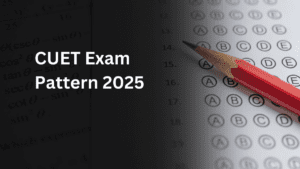CBSE Class 12 Science Syllabus – The Central Board of Secondary Education (CBSE) has released the updated syllabus for Class 12 Science stream for the academic year 2024-25. This comprehensive guide covers all essential aspects of the curriculum, helping students and educators prepare effectively for the board examinations.
Key Changes in CBSE Class 12 Science Syllabus 2025
Streamlined Assessment Pattern
The board continues its focus on competency-based learning with:
- 80 marks for theory examinations
- 20 marks for practical assessments
- Increased emphasis on application-based questions
- Integration of real-world examples in all subjects
CBSE Class 12 Science Syllabus – Subject-wise Breakdown
CBSE Class 12 Physics Syllabus 2025
Unit 1: Electrostatics
- Electric Charges and Fields
- Electric Potential and Capacitance
- Distribution of charges in conductors
- Gauss’s law and its applications
Unit 2: Current Electricity
- Electric current and circuit components
- Kirchhoff’s laws and applications
- EMF and internal resistance
- Potentiometer and its applications
Unit 3: Magnetic Effects of Current
- Magnetic field and force
- Moving charges in magnetic fields
- Current-carrying conductors
- Electromagnetic induction
Unit 4: Electromagnetic Waves
- Displacement current
- Electromagnetic spectrum
- Wave optics and interference
- Diffraction and polarization
Unit 5: Modern Physics
- Dual nature of radiation
- Atomic structure
- Nuclei and radioactivity
- Semiconductor devices
CBSE Class 12 Chemistry Syllabus 2025
Unit 1: Solutions and Electrochemistry
- Types of solutions
- Colligative properties
- Electrochemical cells
- Conductance in electrolytic solutions
Unit 2: Chemical Kinetics
- Rate of reactions
- Factors affecting reaction rates
- Integrated rate equations
- Collision theory
Unit 3: Surface Chemistry
- Adsorption
- Catalysis
- Colloidal state
- Emulsions and their applications
Unit 4: Coordination Compounds
- Werner’s theory
- Ligands and coordination number
- Bonding theories
- Applications in qualitative analysis
Unit 5: Organic Chemistry
- Alcohols, Phenols, and Ethers
- Aldehydes, Ketones, and Carboxylic acids
- Amines and Diazonium salts
- Biomolecules and Polymers
CBSE Class 12 Biology Syllabus 2025
Unit 1: Reproduction
- Sexual reproduction in flowering plants
- Human reproduction
- Reproductive health
- Assisted reproductive technologies
Unit 2: Genetics and Evolution
- Molecular basis of inheritance
- DNA replication
- Genetic code
- Evolution and genetic drift
Unit 3: Biology in Human Welfare
- Human health and diseases
- Immunity
- Biofortification
- Microbes in human welfare
Unit 4: Biotechnology
- Principles and processes
- Tools of recombinant DNA technology
- Applications in agriculture
- Genetically modified organisms
Unit 5: Ecology and Environment
- Organisms and populations
- Ecosystem dynamics
- Biodiversity conservation
- Environmental issues
CBSE Class 12 Mathematics Syllabus 2025
Unit 1: Relations and Functions
- Types of relations
- Functions and their properties
- Inverse trigonometric functions
- Composition of functions
Unit 2: Algebra
- Matrices and determinants
- Linear programming
- Complex numbers
- Quadratic equations
Unit 3: Calculus
- Continuity and differentiability
- Applications of derivatives
- Integration techniques
- Definite integrals
Unit 4: Vectors and 3D Geometry
- Vector algebra
- Lines and planes
- Scalar triple product
- Direction cosines
CBSE Class 12 Science Syllabus – Practical Assessment
Physics Practical Pattern
- 15 experiments (60% weightage)
- Activities (20% weightage)
- Project work (20% weightage)
Chemistry Practical
- Volumetric analysis
- Salt analysis
- Content-based experiments
- Project work and viva
Biology Practical
- Microscopy
- Experiments and spotting
- Project work
- Field study report
CBSE Class 12th Preparation Tips and Strategies
Time Management
- Create a structured study schedule
- Allocate time based on subject complexity
- Regular revision sessions
- Practice previous years’ papers
CBSE Class 12 Syllabus Subject-wise Preparation Strategies
Physics
- Focus on numerical problem-solving
- Understanding fundamental concepts
- Regular practical sessions
- Formula revision and application
Chemistry
- Balance between organic and inorganic
- Regular equation practice
- Laboratory safety protocols
- Reaction mechanisms understanding
Biology
- Diagram practice
- Terminology memorization
- Case study analysis
- Regular practical sessions
Mathematics
- Daily problem-solving practice
- Concept clarity
- Step-wise solution approach
- Formula application practice
Important Dates and Examination Pattern
CBSE Class 12 Examination Schedule
- Practical examinations: January-February 2025
- Theory examinations: March-April 2025
- Results expected: May-June 2025
CBSE Class 12 Exam Pattern
- Multiple choice questions: 20%
- Short answer questions: 40%
- Long answer questions: 40%
CBSE Class 12 Syllabus – Resources and Support
Study Materials
- NCERT textbooks (primary reference)
- Reference books by recommended authors
- Online learning platforms
- Practice papers and mock tests
Online Support
- CBSE official website
- Digital learning platforms
- Subject-specific video lectures
- Interactive learning modules
Conclusion
The CBSE Class 12 Science syllabus 2025 emphasizes comprehensive learning with a focus on practical application and conceptual understanding. Students should approach their preparation systematically, utilizing both traditional and modern learning resources. Regular practice, concept clarity, and time management are key to achieving excellent results.







